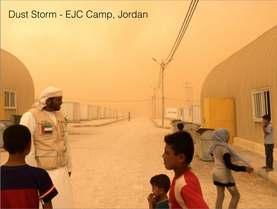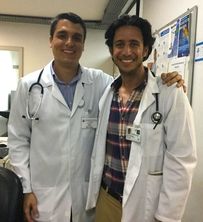 Marhaba! My name is Melissa Carlson, and I am a PhD candidate in the U.C. Berkeley Political Science Department. This summer I will be in Jordan examining how Syrian refugees living in urban areas perceive health care providers, and whether their perceptions influence their willingness to use services offered by particular providers. I plan to capture refugees' perspectives through a variety of different ways: first, through an in-person survey experiment and an experiment conducted through Facebook, both with Syrian refugees; and second, through in-depth interviews with both Syrian refugees and various health care providers in the country, ranging from public officials to private clinics, aid workers, and refugee doctors practicing informally in the country. My project is motivated by puzzling behavior I have observed amongst refugee communities during my previous research on refugees and rights access in Greece, Jordan, and Iraq. Despite minimal access to financial support, Syrian refugees in urban areas and informal camps often use costly, private clinics even when host governments and aid organizations offer free or subsidized services. Similarly, refugees often turn to informal health care providers, such as doctors, pharmacists, and nurses who are refugees themselves, but practicing without a work permit. Lastly, Syrian refugees have crossed the border into Syria to access health care services there, then returned to Jordan, rather than access closer, and relatively safer, services in country. Many refugees forgo accessing health care services, even in emergencies, because they fear that interaction with public officials and aid workers may have negative repercussions. I expect to find that refugees' level of trust in, and perceived credibility of, health care providers directly influences whether they use that provider's services. Through the experiments and in-depth interviews described above, I hope to identify factors that influence Syrian refugees' trust and perceived credibility of health care providers, and assess how refugee perceptions influence their behavior. I am very excited to conduct this research, particularly because I believe that my findings can have direct, positive policy implications for aid organizations and governments responding to crises. I am extremely grateful to CGPH for making my research possible, as well as Dr. Nour Abdo and Amer Abu Shakra from the Jordanian University of Science and Technology, who will provide critical support on the ground. I will be posting updates regularly, so stay tuned! Melissa Carlson
2 Comments
 Bom Dia! My name is Dan and I am a student in the UC Berkeley-UCSF Joint Medical Program. This summer I’m heading to Salvador, Brazil to study healthcare access and utilization for folks living in urban slums. Brazil is a vast, dynamic country, the birthplace of samba, bossanova, capoeira, and home to some of the world’s most fervent football fans. Brazil’s size and history make it complex as well as vibrant, particularly with regards to health. It is wealthy and socially conscious enough to have universal healthcare, but also has one of the world’s largest GINI coefficients (a measure of income inequality) and has nearly a quarter of its population living in slums. My research is a qualitative project focusing on barriers to health care experienced by slum residents, particularly with regards to rheumatic heart disease, a condition that should no longer exist in Brazil. Rheumatic heart disease is a sequelae of strep throat infection that causes valvular dysfunction and death. It exists in Brazilian slums to a degree seen in much less developed countries, despite there being a universal healthcare system. My job is to help shed light on why and how this is (following up on the pilot project I did last summer in Salvador). By 2030 a quarter of the world’s population will be living in slums and we will need to understand how to better provide care. Brazil gives us an interesting and important case study. I am equally excited and grateful to CGPH for making this research possible. Finally, many thanks to Drs. Lee Riley, Melissa Burroughs-Pena, and Ndola Prata for all their guidance and advising the past two years. Ciao! Dan |
AuthorWrite something about yourself. No need to be fancy, just an overview. Archives
August 2017
Categories |
 RSS Feed
RSS Feed
